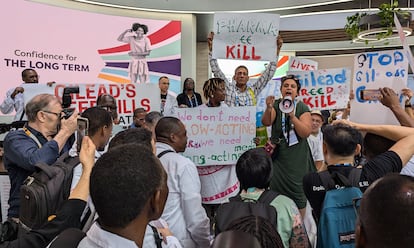Humanity is closer to stopping HIV, and the biggest obstacle is the price of the drug that will do it
Lenacapavir, an antiviral drug already approved as a treatment that costs $40,000 in the US, prevented 100% of infections in a study on African women with just two injections a year. UNAIDS is asking the drugmaker Gilead to reduce the cost in order to make it more widely available

Four decades after the emergence of the human immunodeficiency virus (HIV), humankind is closer to having the tool to put an end to an epidemic that has caused 40 million deaths and incalculable suffering. Lenacapavir, an antiviral drug from the pharmaceutical company Gilead that has already been approved as a treatment of HIV infection in adults, has been shown to be able to prevent 100% of new infections in women if used preventively with a simple administration route: two subcutaneous injections per year.
The Phase 3 trial data was presented on Wednesday at the International AIDS Society (IAS) Conference, which is being held these days in Munich (Germany) and published in The New England Journal of Medicine. It is not a vaccine, but it is very similar. And it was astonishingly effective in a study among cisgender women (women assigned female at birth) in Africa. New trials are now investigating whether the molecule, as expected, will achieve the same results in other groups.
👏 @DTHF_SA’s @LindaGailBekker 🇿🇦 receives a standing ovation after presenting full results from the PURPOSE 1 study. The results confirm #lenacapavir demonstrated 100% efficacy for #HIV prevention in cisgender women. pic.twitter.com/dr2Q94XH9N
— IAC - the International AIDS Conference (@AIDS_conference) July 24, 2024
“The results are impressive. It has shown 100% efficacy in preventing HIV infection in women and adolescent girls” in a trial conducted in South Africa and Uganda, says Vanessa López, director of the non-profit Salud Por Derecho (Health as a Right). It is not usual for the results of a clinical trial to be greeted with a standing ovation by hundreds of doctors. But this is exactly what happened in Munich, in a scene that illustrates how many people who have been fighting HIV for decades believed it to be a historic moment.
Such is the enthusiasm that all eyes have quickly turned to the drugmaker Gilead even before lenacapavir – marketed under the brand name Sunlenca – has been approved for prophylaxis by any regulatory agency (so far it has only been approved as a treatment, not as prevention). “Gilead has the opportunity to make history and bring us closer to ending AIDS as a public health problem,” says Winnie Byanyima, director of the UN program leading the fight against the disease, ONUSIDA.
Byanyima has urged the pharmaceutical company to open up the drug to the Medicines Patent Pool, a UN-backed program that would allow the sale of cheap generic versions to low- and middle-income countries. Two injections of the drug now cost €20,221.5 ($21,961.84) in Spain, according to the official published price (in reality it may be lower according to the confidential agreement reached between Gilead and the Spanish Ministry of Health). In the United States, it’s estimated to cost more than $40,000 as a manufacturer’s list price. Several non-profits and civil society organisations have protested at the IAS congress, asking Gilead to facilitate the universal use of its drug.
A statement from the company welcomed the results of the PURPOSE 1 trial: “Lenacapavir demonstrated zero infections, 100% efficacy and superiority to background HIV incidence for the investigational use of HIV prevention in cisgender women. Lenacapavir also demonstrated superior prevention of HIV infections when compared with once-daily oral Truvada,” another prophylactic treatment that reduces infections but requires taking a pill daily.
In a second statement, also published on Wednesday, Gilead recalls that the use of lenacapavir as a method of prevention has not yet been approved in any country, and that the company is awaiting the results of another trial, PURPOSE 2, which includes other population groups. The results of this second trial will be ready at the end of the year or in early 2025, at which time the pharmaceutical company will begin to seek approval of the drug as a preventive prophylaxis.
GIlead says in its statement that, based on the company’s ongoing commitment to communities affected by HIV, they have developed a strategy to enable broad and sustainable access [to the drug] globally, and will provide answers and details as they become available.
Although it is common for companies like Gilead to accept that their drugs should reach poorer countries under advantageous conditions through solutions such as so-called “voluntary licenses,” organizations like Salud por Derecho are concerned because they consider this option to be insufficient. “The problem is that voluntary licenses are usually limited to poorer countries, while middle-income countries, for example Brazil, Malaysia, Thailand or Peru, are usually left out of these licenses, which limits the access of millions of people to the medicines they need,” says Vanessa López.
A study presented in Munich by British researchers estimates that mass production of lenacapavir could reduce its price to around €40 ($43) per dose, i.e. less than $100 per person per year instead of the current $40,000 in the United States. The study, led by Andrew Hill, from the University of Liverpool, highlights that in sub-Saharan African countries, where most of the world’s infections occur, “77% of new infections are suffered by teenage girls and young women.”
Santiago Moreno, head of the Infectious Diseases Department at the Ramón y Cajal Hospital in Madrid, agrees that lenacapavir “as a prophylaxis can become a great contribution,” although he also highlights that “the price can be a major obstacle.” This expert, a reference figure in the fight against HIV in Spain, points out that the current cost of “pre-exposure prophylaxis pills (PrEP)” is about €30 per month. “The administration of lenacapavir could not be more comfortable: two subcutaneous injections, one every six months, which are effective and safe and with almost no side effects. It is much simpler and more comfortable than current alternatives”, he asserts.
Lenacapavir is the first drug to come onto the market from “a new family of antiretrovirals, called capsid inhibitors,” explains Arkaitz Imaz, a specialist doctor at Bellvitge Hospital in Barcelona and member of the Board of Directors of GeSIDA, the Study Group on the disease of the Spanish Society of Infectious Diseases and Clinical Microbiology (SEIMC). The capsid is a protein envelope of the virus that protects its genetic material and the enzymes it needs for its multiplication.
“It has a mechanism of action that is different from all the drugs that were available until its approval. It is now indicated for people for whom other available drugs no longer work and who have few treatment options. The main objective is for all people to be diagnosed, treated and carrying an undetectable viral load. The scenario is even better if its use can be for prevention to avoid new infections,” concludes Imaz.
Sign up for our weekly newsletter to get more English-language news coverage from EL PAÍS USA Edition
Tu suscripción se está usando en otro dispositivo
¿Quieres añadir otro usuario a tu suscripción?
Si continúas leyendo en este dispositivo, no se podrá leer en el otro.
FlechaTu suscripción se está usando en otro dispositivo y solo puedes acceder a EL PAÍS desde un dispositivo a la vez.
Si quieres compartir tu cuenta, cambia tu suscripción a la modalidad Premium, así podrás añadir otro usuario. Cada uno accederá con su propia cuenta de email, lo que os permitirá personalizar vuestra experiencia en EL PAÍS.
¿Tienes una suscripción de empresa? Accede aquí para contratar más cuentas.
En el caso de no saber quién está usando tu cuenta, te recomendamos cambiar tu contraseña aquí.
Si decides continuar compartiendo tu cuenta, este mensaje se mostrará en tu dispositivo y en el de la otra persona que está usando tu cuenta de forma indefinida, afectando a tu experiencia de lectura. Puedes consultar aquí los términos y condiciones de la suscripción digital.









































